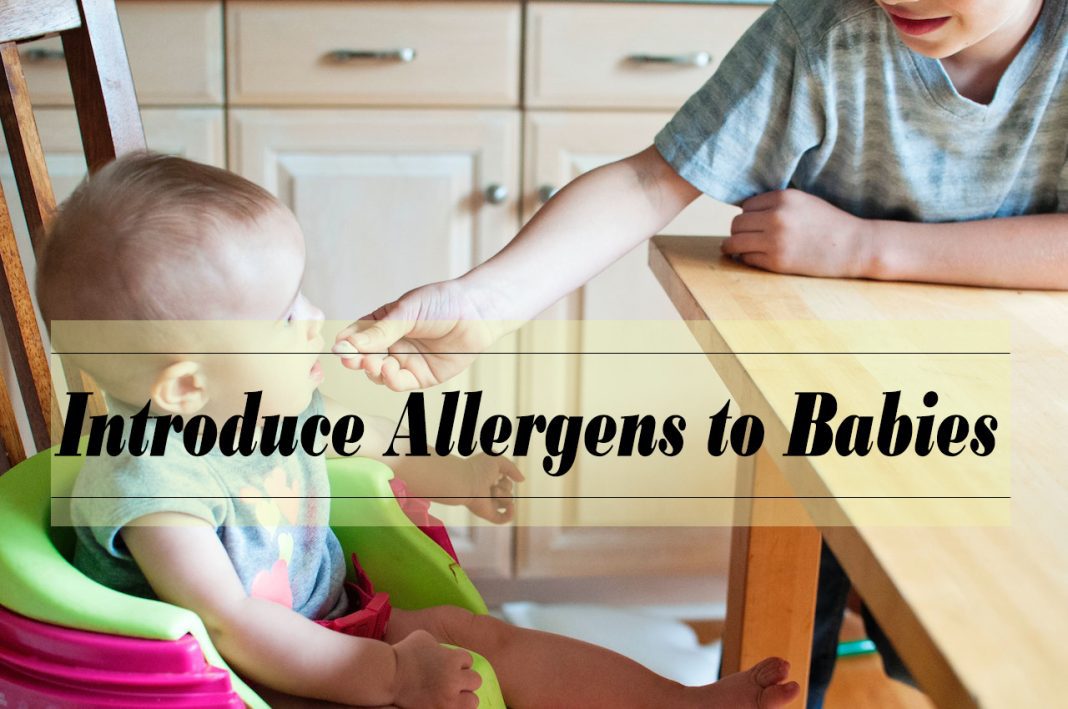It can be painful, of course, to introduce a child to a food that can cause an allergic reaction. However, research shows that introducing key allergens such as peanuts, dairy, eggs, and even fish into your child’s diet more quickly can affect their chances of developing a food allergy. This is especially true for babies who are at higher risk of developing food allergies due to eczema or a family history of such allergies. In most babies, the risk is increased by delaying the introduction of foods that frequently cause allergies.
However, when introducing an allergen into a baby, which allergen should be introduced and how should it proceed? We’ll provide a complete overview, tips on potential warning signs to watch out for, and tips to introduce the allergen to your child more safely.
What are Allergens?
An allergen is a substance that can trigger an allergic reaction. Allergens can be found in many different places, including in the air, in food, and in household products. When someone with an allergy comes into contact with an allergen, they may experience symptoms such as sneezing, a runny nose, or a rash. Some people have severe allergies that can even cause anaphylaxis, a life-threatening reaction.
There are a variety of foods that can trigger an allergic reaction in people who are sensitive to them. These foods are known as allergens, and they can cause a range of symptoms including itching, swelling, and difficulty breathing. Some of the most common allergens include peanuts, tree nuts, eggs, milk, wheat, and soy. In severe cases, an allergic reaction can even lead to anaphylaxis, a potentially life-threatening condition. Allergens can be found in both processed and natural foods, so it’s important for people with allergies to read labels carefully.
Why Should I Introduce Allergens to My Child / Baby
Early introduction of food allergens into babies is associated with efforts to reduce the likelihood of allergic reactions. The American Academy of Allergy, Asthma and Immunology defines this as “when the immune system overreacts to harmless substances known as allergens.”
With regard to peanut allergy, which affects up to 2% of children and can be severe and long-lasting, the American Academy of Pediatrics (AAP) recommends babies (usually babies with a family history of eczema) at a higher risk of developing food allergies. allergy, etc.) or pre-existing food allergy), we plan to introduce peanut protein between 4-6 months [1]. This is a notable reversal of the 2000 AAP’s guidelines, recommending that the introduction of peanuts be deferred until age 3 in high-risk infants.
In fact, a 2021 study found that the introduction of high-allergenic foods such as peanuts and eggs at 4-6 months of age could reduce the risk of developing food allergies in children, particularly those at high risk for food allergies [2]. In other words, if you feed your child late with the food you are allergic to, you may increase your child’s risk of developing an allergy.
Paediatricians generally recommend introducing a major allergen to all babies from 4 to 6 months of age, with the goal of introducing as many as possible by 1 year of age.
Experts note that the immune system is specific to proteins and learns from each food individually. So, while feeding your child peanuts on a regular basis may prevent peanut allergy development, it will not protect against other foods. That’s why experts recommend intentionally introducing and maintaining a variety of foods, including allergens, such as dairy, eggs, fish and soy, into your baby’s diet during infancy, when the immune system is most open to learning.
When Should Allergens Be Introduced in Babies?
The Canadian Pediatric Society (CPS) and the Canadian Society of Allergology and Clinical Immunology (CSACI) recommend that all children receive allergens by 6 months of age, but not before 4 months of age. This recommendation applies especially to peanut butter and eggs. There is some evidence that introducing the allergen into the body when the allergen occurs can help prevent obesity.
There are 9 types of allergens, so it is difficult to introduce them all until 6 months of age, so many allergens recommend starting at 4 to 6 months of age. Personally, I introduced complementary foods to my two daughters after 4 months, and gave them enough time to introduce allergens along with supplemental foods such as iron-rich foods, fruits and vegetables. I was breastfeeding at the time and continued to breastfeed. The introduction of solids did not prevent this.
How Can Allergenic Foods Be Introduced?
It’s best to try one new allergen at a time. That way, if your baby has an allergic reaction, it will be easier to identify which foods are causing the reaction.
If your baby is not allergic to new foods, continue feeding them twice a week. If you don’t feed them regularly after trying them, allergies can occur. Mix a small amount of new food with your baby’s regular food. If your baby does not respond, you can gradually increase the amount next time.
You can try new allergies every day, but don’t forget to introduce your child to a regular diet and then continue feeding them.
To test the type of food before your baby eats, rub a small amount of food on the inside of your baby’s lips. If there is no reaction after a few minutes, your baby may be trying to eat. Do not rub food on your baby’s skin. This does not indicate whether or not your child will have an allergic reaction.
Is It Important to Introduce Allergens to Babies?
Many families do not feel the need to introduce the allergen early because they feel that their children are at low risk of developing a food allergy. We are often told, “My family has no food allergies.” I wish it was that simple, but unfortunately it isn’t. According to the Canadian Pediatric Society, children themselves are considered to be at a higher risk of developing a food allergy if they themselves have allergies or eczema, or if they have close relatives with allergic conditions.
For example, the child of a sister who has asthma is at a higher risk. Children whose parents have seasonal allergies are also at increased risk. Conclusion – The risk to your baby may be greater than you think. Food allergies can occur even in babies without risk factors.
What is the Best Time to introduce Allergens
Try introducing new allergy foods during daytime meals. That way, if your child has a reaction, you can keep an eye on them. easily.
Eight Food Allergens
These food intolerances have the potential to cause allergic reactions, etc., and 160 foods have been identified as potential allergens.However, 8 foods account for 90% of the overall results.
Here are the 8 food allergens:
• Milk
• Fish
• Eggs
• Wheat
• Peanuts
• Crustacean Shellfish (shrimp, crab and lobster)
• Tree Nuts (walnuts, pecans, almonds, cashews, pistachios)
• Soy
SYMPTOMS OF A FOOD ALLERGY
After introducing a potential new food allergen to your child, how do you know if your child is allergic? Symptoms of an allergic reaction may include the skin, digestive system, cardiovascular system, and/or respiratory system. These symptoms can vary from person to person and from case to case.
It is important to know that a minor reaction can occur once, but a serious reaction to the same food can occur when the food is introduced later.
Symptoms of a food allergy include:
• Itchy rash (eczema)
• Hives (red spots that look like insect bites)
• swelling of the lips and face
• Anaphylaxis
• sneezing, wheezing or sore throat
• dizziness
• Nausea, vomiting, or diarrhea
• loss of consciousness
• pale skin
Best Ways to Introduce Allergens to Babies
Discuss Your Plan
Talk to your child’s doctor or allergist about plans to introduce solid foods and allergens. Your child may be at a higher risk of developing a food allergy if someone in your child’s family has a food allergy or has a family history of other allergic conditions such as eczema, asthma, hay fever, or atopic dermatitis.Children with allergies or severe eczema may also be at greater risk
Keep Allergens in Baby’s Diet
Introduce potential food allergens and provide them regularly if your child is doing well. This will help your child maintain tolerance.
One Major Allergen at a Time
Unless your doctor tells you otherwise, give your child one major allergen at a time, no faster than new food every 3-5 days. Any food exactly. Symptoms that may be related to the introduced allergen.
When introducing food allergens, make sure the texture is suitable for your baby’s development. Avoid choking hazards like whole peanuts.
Dairy products such as cheese and yogurt can be tried before 1 year of age, but whole milk should be avoided until after 1 year of age. The reason has nothing to do with allergies, but it is worth noting that babies cannot easily digest whole milk.
Ideas to Introduce Allergens to Babies for the First Time
Incorporate this allergen into textures your child can handle. Here are some puree and soft food ideas for your child’s stages.
• Eggs: small pieces of scrambled eggs or boiled eggs
• Dairy (milk): whole milk yogurt or grated cheese
• Soy Sauce: Tofu puree or small cubes of tofu
• Peanuts, nuts, and sesame seeds (best served in butter or powder form): Mix a small amount of nut butter or nut powder into a fruit or vegetable puree, or spread a very thin layer of nut butter on toast strips. You can also add butter or powder to your smoothies.
• Wheat: Children’s wheat cereal like wheat cream, toothed cookies with wheat, or slices of whole wheat toast with a little butter
• Fish: Soft, moist, well-cooked fish, mashed or cut into pieces.
Final Note
There are a few general guidelines that can be followed. First, it’s generally recommended to wait until a baby is at least 6 months old before introducing solid foods, and that includes allergens. This is because a baby’s digestive system is still developing and may not be able to handle solid foods, let alone allergens, until around this age.
Second, it’s important to introduce allergens gradually, starting with small amounts and increasing over time. This will help your baby’s body adjust to the new food and reduce the risk of an allergic reaction. Finally, it’s always a good idea to speak to a pediatrician before introducing any new food to your baby, especially if allergies are a concern.
FAQ’s
What’s a smart way to introduce allergens to your baby?
• Don’t worry about it. The baby will be OK.
• Gradually expose baby to allergens in controlled quantities.
What is the best and safest way to introduce allergens to babies?
• Peanut butter on a spoon
• Peanut butter mixed with other food that is already in the diet
How do you introduce your baby to peanuts?
• I don’t. I keep them away from peanuts until the baby is 3-4 years old.
• Offer a tiny taste of peanut butter off my finger, not cooked in any way.
• Spread a little peanut butter on a cracker or toast, let them try it a couple of times, then take it away.
• Give them peanut butter every time I eat it and do not attempt to limit their intake.
Read Also:-

